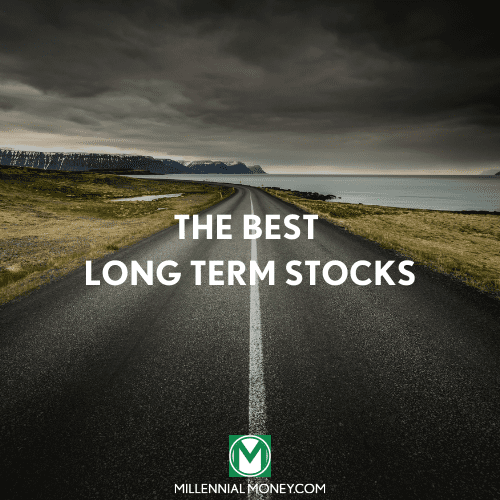There are two fundamental ways you can approach the stock market. You can either attempt to track the performance of individual indexes — or you can try and beat them.
Neither strategy is incorrect.
Truth be told, most investors build robust portfolios that attempt to marry both strategies by opening a brokerage account on a site like Charles Schwab or Fidelity and buying a mix of index funds and individual stocks.
Index Funds
What is an Index Fund?
An index fund is a type of investment that attempts to track indexes like the S&P 500 or the Dow Jones Industrial Average (the Dow).
When you invest in an index fund, you’re investing in a single portfolio that pulls together multiple companies spread across an index. For example, the S&P 500 index tracks the 500 largest companies listed on U.S. stock exchanges while the Dow Jones index tracks 30 blue-chip stocks across all industries.
There are many types of index funds based on different segments and industries. If you want to buy shares in one, keep in mind that these funds often require a minimum investment (e.g., $5,000). In many cases, you can’t just buy a share or two.
The Benefits of Index Funds
Below are some of the biggest benefits of investing in index funds:
Broad Market Diversification
One of the top reasons to invest in index funds is that they provide low-cost access to a diverse set of securities. Your chances of success are higher in the long-term with index funds because you don’t put all of your eggs into one basket with this type of investment. Just buying a handful of funds can leave you with quite a diversified portfolio.
Reduced Risk
Index funds tend to limit market volatility for their investors. They will fluctuate from year to year. But over time, they generally produce a healthy ROI, matching the returns of the broader market, which makes them solid long-term assets for your investment portfolio.
Easy Entry into the Market
Another great aspect of using index funds is that they provide easy market access for new investors. When buying index funds, you don’t have to do quite as much research into the individual companies that you are purchasing. Instead, you just have to focus on the type of fund that makes sense for your particular investing strategy.
The Risks of Index funds
Below are some of the downsides to investing in index funds:
Fees
Some index funds can come with higher fees while others have relatively low fees. As such, it’s vital to pay attention to fees when buying particular funds.
One of the top metrics to keep an eye on is the expense ratio, which lets you know how much of the fund’s assets are going toward administrative, advertising, and management purposes (in other words, things that don’t directly make you money).
Limited Short-Term Gains
If you’re looking for short-term gains, index investing is probably not the best option. Since your investment is spread out over multiple companies with an index fund, your chances of experiencing explosive short-term growth are limited.
What’s more, index funds like the ones mentioned here weigh large-cap funds, bypassing small-cap funds that can offer larger growth potential (though greater risk).
Reduced Flexibility
Since index funds track specific indexes, they lack the flexibility that other types of investments have. This can be frustrating for investors — especially during times of high volatility.
For example, during a market downturn, index funds typically experience a similar drop because they track indexes. However, there are some strategies that experienced fund managers utilize to minimize risk.
Active vs. Passive Funds
One important thing to keep in mind when investing in the stock market is that funds can be either actively or passively managed.
All index funds are passive, meaning they track a market index or segment and do not require a hands-on approach from an investment manager.
An actively managed fund, on the other hand, is one where investment managers make decisions about how to invest and grow the fund to try and beat a market index. These tend to have higher fees and the hands-on approach is certainly no guarantee of outperformance.
In fact, many actively managed funds don’t measure up to their passive counterparts, so check track records before diving in.
Mutual Funds and ETFs
Two additional types of investments to know about are mutual funds and exchange-traded funds (ETFs).
A mutual fund pulls together money from numerous investors and invests in strategic bonds, stocks, and other securities (e.g., silver). While there are some passively managed mutual funds, most are actively managed. Therefore, they typically carry more risk than index funds in exchange for larger growth potential.
ETFs are based on collections of securities and are built to track specific indexes. The main difference between index funds and ETFs is that index funds are bought and sold based on the price at the end of the trading day while ETFs are traded throughout the day much like stocks.
Most ETFs are passively managed.
Learn More:
Using Index Funds to Invest in Real Estate
One great aspect about index funds is that you can use them to invest in real estate, without having to deal with tenants, maintain a property, or buy a property outright.
Many investors choose to leverage real estate investment trusts (REITs), which own and operate income-producing properties. REITs are generally considered a low-risk way to enter the real estate market as an investor.
Individual Stocks
As you can see, index funds, mutual funds, and ETFs all involve purchasing (tiny) portions of multiple companies. The opposite approach is to invest in individual stocks, which involves purchasing direct shares from individual companies.
What is a Stock?
When you buy a stock, you are purchasing a security that grants you partial ownership of that organization. The more stock you have in a company, the more ownership you possess. And that’s a great way to frame your thinking as you begin investing in individual stocks and you start hearing about the latest “hot ticker.”
Do you want to be an owner in a company you know nothing about or do you want to be on board with a great business you believe in?
The Benefits of Buying Stocks
Below are some of the biggest benefits of buying shares of individual companies:
Explosive Growth Potential
Stocks have the potential to produce much higher returns than other types of investments in a shorter time frame. People who had the foresight to invest in Amazon when most of the population doubted the entire concept of e-tail saw their investments increase thousands of times over.
But here’s a secret: as recently as 2017, when even your grandparents knew about Amazon’s dominance, shares were still under $1,000 each. So investors who bought in just a few years ago have at least tripled their money.
Unfortunately, many newer investors think of stocks the same way they think about a roulette table in a casino. They chase “hot stocks” that someone is hyping on some social media platform. This strategy very rarely works.
Penny stocks are especially hazardous for new investors. Shares of these companies are worth pocket change for a reason, and the hype around them is often a “pump and dump scheme” designed to separate naive investors from their money.
But for people who are willing to put in the time to do a bit of research and find great companies, the stock market is an amazing wealth-building machine.
Flexibility
When buying stocks, you have much more flexibility than you do when purchasing index funds, ETFs, and mutual funds. Skilled investors can assemble diversified portfolios — large, established companies and smaller, riskier companies; companies in many different sectors; companies that pay dividends (periodic distributions), and even companies in different countries.
Limited Liability
Buying stocks is considered passive ownership. In other words, as a stockholder, you can benefit from having partial ownership in a publicly-traded organization without having to take responsibility for its decisions. So, if a stock fails or the company makes a bad decision, investors don’t have to pay for any damages or take the heat. The tradeoff is that you can lose all of your money as there is no protection or insurance against losses.
The Risks of Stocks
Below are some of the common downsides to investing in individual stocks:
High Volatility
The stock market is highly volatile, and investments constantly fluctuate in value. Volatility refers to the measure of consistency than an index or investment performs based on its benchmark or historical average.
When you invest heavily in individual stocks, your portfolio is exposed to greater volatility than if you invest in indexes. The key to successful investing is how you handle that volatility. If a stock you own drops 10% in a day, will you panic and sell or lose sleep over it? If it jumps 10%, will you sell right away to lock in a profit, even though that might cost you far bigger future returns?
Great investors have an investment thesis around each stock they buy, and then hold on as long as that thesis remains in place. They don’t get caught up in watching the day-to-day fluctuations of their portfolios.
Headline Risk
Another issue facing investors is headline risk, which is when a news story can affect the price of an investment or even an entire market.
For example, suppose a headline appears that a common food modifier may cause cancer. This may spook investors, causing stock prices on certain products to plummet overnight. If you purchase individual stocks based on food companies or based on specific food indexes, you could wind up losing a lot of money very quickly.
Overconfidence
Yet another risk about buying stocks is becoming overconfident about your investments. For example, investors sometimes put too much concentration on a single sector or company when buying stocks. This can lead to questionable buying decisions.
How to Buy Index Funds and Stocks
Buying index funds and stocks has never been easier. All you have to do is select a brokerage firm, open an account, and fund it. A broker is a company that buys and sells financial products on a customer’s behalf. Once your account is funded, just select the securities you want to procure and place the order.
There are many different companies to choose from, including Fidelity, Schwab and E*TRADE. Brokers can vary significantly in terms of the tools that they offer investors and their fee schedules, so it’s a good idea to browse the market before deciding where to set up shop.
Learn more:
Budgeting for Capital Gains Taxes
New investors need to remember that investments like stocks and index funds are subject to capital gains taxes, but only if you sell your shares. These taxes depend on your level of income, as well as how long you owned the shares (there’s a higher cost if you sell less than a year after you bought them).
Certain types of retirement funds like traditional IRAs and 401(k)s are not subject to taxes until you withdraw your funds.
FAQ
Can you build your own mutual fund?
It is technically possible to build your own mutual fund. But it requires a considerable amount of work. You’ll need to set up a corporation and then apply with the Securities and Exchange Commission (SEC). This is not a viable option for most investors.
Can you get rich using index funds?
You certainly can get rich with index funds. But it can take longer to earn returns and double your investment. Index funds generally are more secure than individual stocks. But with greater diversification, you’re probably not looking at overnight riches. You have to be patient with them.
Should new investors buy individual stocks?
New investors are encouraged to focus on diversification and build portfolios that match their risk tolerance. For example, young investors typically have higher risk tolerance as they have decades to achieve growth. There’s nothing wrong with buying individual stocks and index funds, as well as mutual funds and ETFs.
The Bottom Line
The best way to grow your income and manage risk is to have a solid investment strategy. Consider talking to a personal finance professional to go over your situation and determine a strategy that fits your individual needs.
That said, index funds and stocks are something that any investor can purchase without much work or experience. Both are sound investment vehicles that can earn a lot of money over time, enabling investors to increase their wealth. And you might have fun doing it!
Survey the investment landscape, research your options, and make moves you’re comfortable with. With enough patience and perseverance, financial independence may be closer than you think.





No comments yet. Add your own